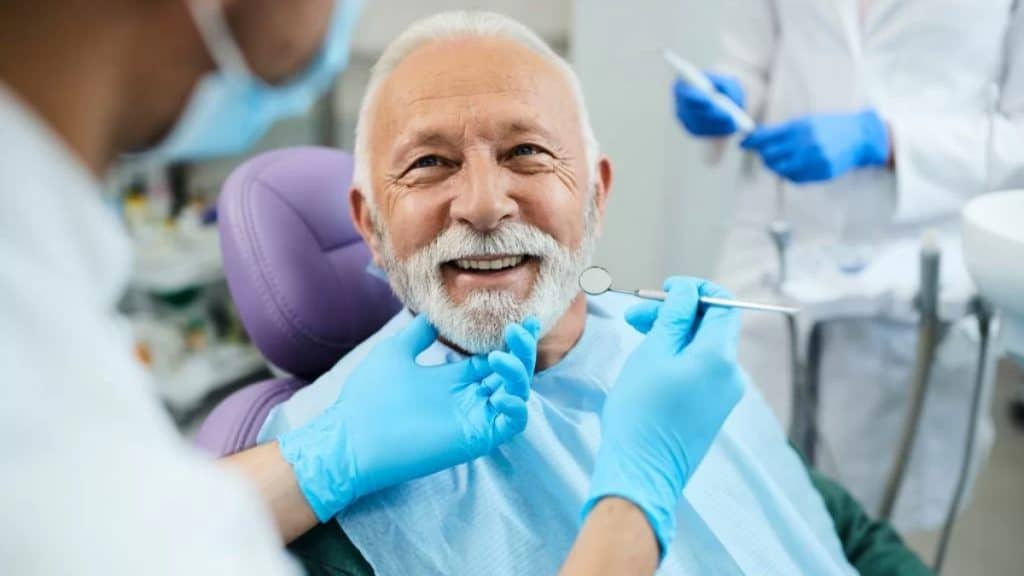Apparently, the importance of maintaining good oral health isn’t linked to age. When a tooth aches, it aches, regardless of whether you are 20 or 60 years old. However, seniors are more susceptible to specific dental health issues, so it’s crucial for them to know how to prepare for dentist visit and bravely make an appointment afterward.
We all wish we knew certain information in advance to avoid shedding tears over a lost tooth. It’s never too late. Learn how to care for your oral cavity properly and what to consider if you want to visit a dentist at a respectable age.
5 Common Dental Issues Faced by Seniors
Facing these common dental issues, seniors usually perceive them as part of the aging process. However, regular dental visits and sufficient oral hygiene can help them prevent:
- Periodontal (gum) disease. This severe progressive infection of the tissues surrounding the teeth is caused by bacteria buildup. The first wake-up calls are bleeding gums while brushing or flossing, gum recession, redness, and loose teeth. If you notice any of these symptoms, rush to the dental office as soon as possible.
- Tooth decay. Toothache, dark spots on your teeth, tooth sensitivity, and consistent bad breath are unpleasant signs of tooth decay. A timely dental appointment can save your teeth from further damage. A doctor can apply a filling to cure small cavities and a crown or root canal—for more serious conditions.
- Dry mouth. A dry mouth causes bacteria to spread in the oral cavity, which might result in gum disease and tooth decay. Drinking enough water throughout the day and using a humidifier might help to relieve the symptoms, but it’s better to ask your doctor for medication.
- Tooth loss. Older adults are more at risk of losing their teeth due to gum disease or tooth decay, inducing them to seek dental implants in Queens NYC, Washington, D.C., or any other city around the globe. No wonder: this is a common problem among seniors, making regular dental checkups a must.
- Oral cancer. Unfortunately, age can play havoc in this case: people over 40 face nearly 95 percent of oral cancer. Frequent dental checkups enable your dentist to identify oral cancer symptoms at the early stages, including reddish or white spots and lumps inside the mouth.
Why Regular Dental Visits Are Crucial?
By visiting a dental office at least twice a year for a substantial examination and dental cleaning, you ensure a doctor timely detects a dental issue and takes measures to avoid complications. Dental checkups help seniors maintain good oral health and prevent the most widespread dental problems. Getting an early diagnosis increases your chances of successful treatment.
Impact of Oral Health on Overall Well-Being of Seniors
Oral health and overall health are tightly interlinked: bacteria in the mouth can spread and harm other body parts. If you neglect oral care routine, this might lead to a wide array of health issues, such as:
- heart disease;
- respiratory infections;
- diabetes;
- dementia.
As seniors experience age-related alterations in the oral cavity, their existing health conditions can worsen or new ones might appear. Thus prioritizing their oral health is essential for good overall well-being.
7 Preventive Care Tips for Seniors
Prevention is crucial for managing common dental problems among older adults. Here are several actionable tips:
- Schedule regular dental check-ups.
- Maintain thorough oral hygiene.
- Monitor your oral health condition.
- Adhere to a well-balanced diet.
- Stay sufficiently hydrated.
- Avoid smoking and alcohol consumption.
- Care for your dentures correctly.
By making these healthy lifestyle choices, seniors can greatly support their overall oral health and prevent potential dental issues.
Special Considerations for Senior Dental Visits
Maintaining good dental care comes with unique challenges for older adults:
1. Addressing dry mouth. Dry mouth symptoms can cause excessive plaquebuild-up, so seniors might need a thorough dental cleaning more than twice a year. They should also pay more attention to brushing and flossing daily. An electric toothbrush might be easier to handle.
2. Medication management. Seniors should always inform their dentist about the medications they are currently taking. Some drugs might cause oral side effects, so a doctor can recommend alternatives to reduce their impact on oral health.
3. Dentist’s specialization. It would be great to find a reputable dentist specializing in senior care. Do some research and ask your acquaintances and other seniors for recommendations.
Keep Radiant Smile for a Lifetime
Understanding the unique dental challenges seniors commonly face and implementing appropriate oral care practices can greatly enhance their quality of life. Regular dental visits, meticulous oral hygiene, a nutritious diet, and timely medication management can help older adults achieve optimal dental health and enjoy a better quality of life.
